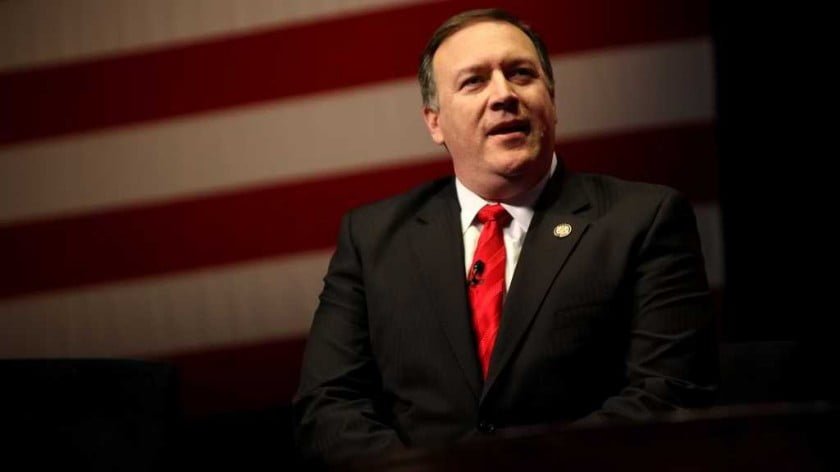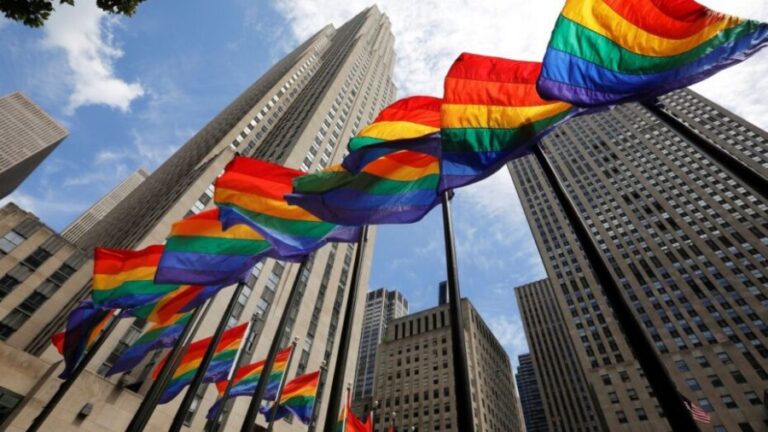‘New World Order’ Wine Pompoured into a Pro-‘Sovereignty’ Rhetorical Bottle
Secretary of State Mike Pompeo began his December 4 speech in Brussels at the German Marshall Fund with “a well-deserved tribute to America’s 41st president, George Herbert Walker Bush,” whom he praised as “an unyielding champion of freedom around the world.” It was fitting that he did so. The heart and soul of Pompeo’s remarks extolling the return of “the United States to its traditional, central leadership role in the world” were little more than a rehash of Bush the Elder’s aggressive internationalism.
Pompeo (or his speechwriter) should be given credit for a masterpiece of misdirection. While the substance of his speech was a blast of stale air from the 1990s, the rhetoric was all Trumpism and national sovereignty – but only for countries obedient to Washington: “Our mission is to reassert our sovereignty, reform the liberal international order, and we want our friends to help us and to exert their sovereignty as well.”
What about the sovereignty of countries the US doesn’t count as “friends”? Well, that’s a different story: “Every nation – every nation – must honestly acknowledge its responsibilities to its citizens and ask if the current international order serves the good of its people as well as it could. And if not, we must ask how we can right it.” [emphasis added]
So according to Pompeo, the United States and our vassals (“we”) have an obligation (“must”) to fix international actors that in our infinite wisdom are not serving “the good of their people.” For example, “Russia hasn’t embraced Western values of freedom and international cooperation.” (Why should Russia care what “we” think of its values – and why should its values be “western,” anyway? Never mind! We “must” do something about it!)
This assertion constitutes not only a right but a duty of the US to dictate not only the external policies of every country on the planet but even their internal order as well if judged by all-knowing Washington to be insufficiently serving the good of their people. This means that some countries (the US and our “friends”) are sovereign, but countries we deem to be failing their people are not. Even Leon Trotsky would shrink from making such a declaration.
This alone gives the lie to the claims of the Swamp-critters Trump has put in charge of his administration that the US is “only” trying to impact behavior. (As in Pompeo’s “We welcomed China into the liberal order, but never policed its behavior.” So now we’re the police too.)
Would the Russians meet Pompeo’s standard if, say, they returned Crimea to Ukraine (presumably over the strong objections of the large majority of its residents who voted to join Russia)? Of course not. Russia would still be our No. 1 enemy.
What if the Russians “admitted” to Pompeo’s self-certifying accusations of violations of the INF Treaty and Chemical Weapons Convention, and then took the actions the US demands? Not good enough.
Maybe a gay parade through Red Square to show love of “Western values”? Getting warmer, but still no …
Admittedly, this arrogant attitude of being both the big player on the geopolitical field as well as the globocop referee (and enforcer) didn’t originate with Pompeo. Let’s recall how George H. W. Bush described America’s mission in his 1991 State of the Union:
‘What is at stake is more than one small country [.i.e., Kuwait], it is a big idea – a new world order, where diverse nations are drawn together in common cause to achieve the universal aspirations of mankind: peace and security, freedom, and the rule of law. Such is a world worthy of our struggle, and worthy of our children’s future. … The world can therefore seize this opportunity to fulfill the long-held promise of a new world order – where brutality will go unrewarded, and aggression will meet collective resistance. Yes, the United States bears a major share of leadership in this effort. Among the nations of the world, only the United States of America has had both the moral standing, and the means to back it up. We are the only nation on this earth that could assemble the forces of peace.’
Notably missing is any concern about the United States itself, the security of our own borders and territory, and the welfare and prosperity of the American people. Instead American “leadership” is needed to usher in a globalist utopia defined by Goodthink “universal aspirations of mankind: peace and security, freedom, and the rule of law.”
One would think that at this point in the 21st century people would be wary of regurgitated Leninist claptrap, especially since it has dominated US policy for almost three decades. It’s all here:
- Democratic centralism (which is NATO’s operating principle: there’s democratic debate until the US decides, after which there’s centralism; US “allies” in NATO have less independence than members of the Warsaw Pact did).
- Control of mass communication and information that are closely in sync with the ruling apparatus and have about as much diversity of viewpoint as Soviet media circa 1980 (though more and more American Thought Criminals are seeing the shutdown of dissent on the internet and social media through deplatforming, shadowbanning, skewing search results, and cutting off domains and payment systems as an attack on our samizdat alternative to the official media).
- The bipartisan establishment would never admit that killing millions of people is a valid way to bring about utopia, but they have been willing to do just that in wars of choice in the Greater Middle East (including the Balkans and Afghanistan) and willing to risk far, far more deaths by pushing Russia (and China) to the brink. This is facilitated by sophisticated information control with features such as “atrocity porn” that acts as a transmission belt.
Not only is all of this Bolshevik to the core, much of it is specifically Trotskyite. That’s literally true at least for the influence of the neoconservative movement as it developed originally out of the exodus of Max Schachtman and his followers, who were expelled from the official US communist party in 1928, and then went through several party name changes, finally ending up as Social Democrats USA. As Justin Raimondo of Antiwar.com summarizes it:
‘ …[T]here is plenty to see, first and foremost the Trotskyist DNA embedded in the neocon foreign policy prescription… The Trotskyists argued that the Communist Revolution of 1917 could not and should not be contained within the borders of the Soviet Union. Today’s neocons make the same argument about the need to spread the American system until the U.S. becomes a “global hegemon,” as Weekly Standard editor Bill Kristol puts it. Trotsky argued that socialism in one country was impossible, and doomed to failure: encircled by capitalism, surrounded by enemies constantly plotting its downfall, the “workers state” would not survive if it didn’t expand. The neocons are making a similar argument when it comes to liberal democracy. Confronted by an Islamic world wholly opposed to modernity, Western liberal democracy must implant itself in the Middle East by force – or else face defeat in the “war on terrorism.” Expand or die is the operative principle, and the neocons brought this Trotskyist mindset with them from the left.’
Very few Americans who don’t themselves come from far-left and émigré fever swamps have much of an idea of any this to this very day. Starting in earnest in the 1980s under Reagan, large numbers of neocons, who had previously styled themselves Henry “Scoop” Jackson Democrats, began to enter the governing apparatus on the strength of their intellectual and academic credentials and their strong anti-Sovietism. Regarding the neocons’s hostility to the USSR, originally an expression of their anti-Stalinism, “regular” Americans conservatives, whose own moral views were closer to ordinary Americans’, mistook it for simple anti-communism. Little did most of them suspect that the neocons were even more devoted to world revolution than was Brezhnev’s Politburo, and that to them the US was little more than a base of operations, just as the Bolsheviks had earlier viewed Russia.
The neocons’ influence leveled out but did not disappear under the presidency of George H.W. Bush (1989-1993), to whose credit also has some balance from relative “realists” like Henry Kissinger, Brent Scowcroft, and James Baker. However, neocons were able to make major gains under Bill Clinton (1993-2001) in alliance with so-called “liberal internationalists” like Madeleine Albright, Strobe Talbott, Richard Holbrooke – and of course Hillary Clinton. While reflecting somewhat different priorities (notably on the mix between America as the engine of world revolution vs. the role of the United Nations), the neocons and liberal internationalists found common ground in so-called “humanitarian interventionism,” notably in the Balkans. The neocons’ only criticism of Clinton’s in Bosnia and Kosovo (and later of Obama’s in Libya and Syria) was not being militant enough; accordingly the neocons (mostly outside of the Executive Branch in those years but well-represented on Capitol Hill and in think tanks) helped the liberal internationalists beat back partisan Republican and residual realist skepticism for Clinton’s wars.
When the GOP again controlled the White House under George W. Bush (2001-2009), the liberal internationalists returned the favor by whipping up Democratic support for the invasion of Iraq. By that time the neocons were in virtually total control of the Republican’s foreign policy in powerful alliance with representatives of the Deep State complex centered on the Pentagon and military industries. This latter group, known as the “Vulcans,” included people like Dick Cheney, Donald Rumsfeld, Colin Powell, Paul Wolfowitz, Richard Armitage, and Condoleezza Rice. Then, when the Democrats took over again under Barack Hussein Obama (2009-2017), the liberal internationalists’ militancy was championed by a “triumfeminate” of Hillary Clinton, Susan Rice, and Samantha Power (known as the “genocide chick”), under whom “responsibility to protect” (R2P) became a dominant principle of US policy, again with vocal neocon support.
With Donald Trump’s election, it was hoped by many of his supporters that his “America First” views and stated desire to get along with Russia and to get the US out of places like Afghanistan and Syria, as well as his criticism of NATO, signaled a sharp departure from the influence of the neocons and their liberal interventionist and Vulcan allies. Alas, that was not to be. As Pompeo’s Max-Schachtman-masquerading-as-Pat-Buchanan speech shows, the neocon/Deep State lock remains on a policy that hurtles heedlessly forward towards disaster.
By James George Jatras
Source: Strategic Culture







